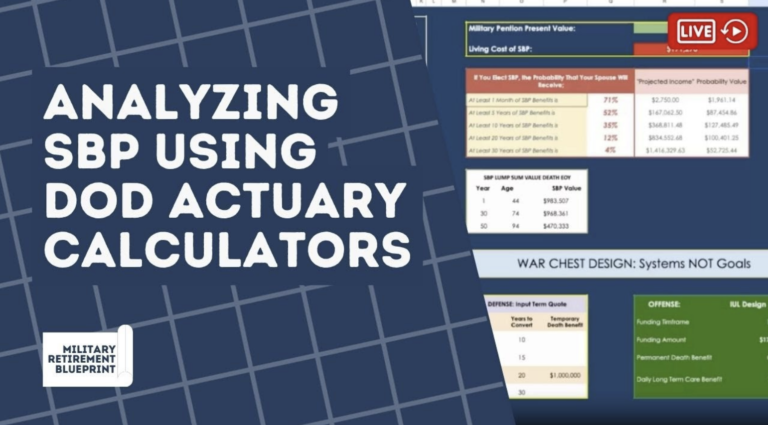What Should I Do With My Thrift Savings Plan When I Retire From The Military?
Many career military families are concerned about how they will live on a fixed income after retiring from the military. One of the greatest fears veterans have is not being able to afford their bills or having to rely on family members for financial support because there isn't enough money left over at the end of each month.
Fortunately, there are ways you can prepare yourself financially so that this doesn't happen to you. Taking advantage of your Thrift Savings Plan (TSP) when you retire is one way that many retired military members are making sure they don't run into problems down the road.
Many of you who served in the military also saved money into a Thrift Savings Plan (TSP) for when you retire. What should you do when it is time to retire from the military but your TSP account has grown so large that it would be unwise to withdraw funds? What are some options for what to do with your TSP when retiring from the military?
3 Things to Consider Before Moving Your TSP
When you retire it is important to be smart about how you move your TSP. Here are three things to consider before moving your tsp.
1. The 4% Rule Faces New Problems Today
We need to think about retirement differently in light of the recent rise in inflation, market volatility, and economic uncertainty. The old approach was to diversify your assets in order to get a modest 5-6% return.
You won't run out if you only take 4% for retirement instead of 6%. But life isn't that simple anymore.
2. Your TSP Retirement Savings Are Not Guaranteed By The Government
Retirement can be expensive, especially when you are no longer able to earn additional income. That's why it is critical that your TSP savings last through retirement - if not indefinitely. What happens if the risk associated with investing proves too great?
3. What Should Veterans Who Are in The Federal Employees Retirement System Do With their TSP?
When Veterans leave the federal government they are typically in the same situation as many federal employees. Unlike when they left uniformed services they now most likely are older than age 55 and will qualify for tsp withdrawals. Their tax liability will depend on how much comes from Roth TSP funds.
Investment Options for your Post-Military Thrift Savings Plan account
When you leave the military, you may choose from a number of TSP rollover alternatives. You can maintain your TSP account or convert it to an IRA account. Here are some options to consider.
Should I cash out my TSP Account?
You have the option to pay taxes on the money and withdraw it right away. This is an option for those who need the money sooner than later. But this does not make good financial sense as you will pay a lot of tax to access your own funds (most likely 25%) and at such a young age there would be little time for that amount of growth
Withdraw your TSP assets in a lump sum
This could be a good option if you have no other retirement assets. The downside is that it could cost you 20% or more in taxes and you would pay the penalty for early withdraws.
If you're over age 59.½, then withdrawing any of the TSP's funds will not incur a penalty but you would have a large tax requirement on a lump sum withdrawal from a traditional TSP account.
Should I move my TSP to an IRA?
Of the many investment options one of the most common choice for those who want to take more control of their retirement savings is to roll their TSP into an Individual Retirement Accounts for unlimited investment options. You can open a traditional IRA, Roth IRA or even a self-directed account.
Should I roll my TSP accounts into a Traditional IRA or Roth IRA?
Converting your Roth TSP to Roth IRA allows you to continue investing in the stock market and also avoid taxes but on withdrawal of funds from Roths tax-free.
Transfer the assets to a TSP annuity
This is a life annuity contract where you can receive monthly payments until death. The TSP will purchase an insurance policy and make the payout.
Converting your traditional TSP account to a life annuity (also called "lump-sum conversion") allows for lifetime income but not much growth as it would be considered safe assets.
Roll Your TSP into a Fixed Index Annuity
There are many life annuities that can be purchased from any life insurance company. These companies will use the money you have accumulated in your TSP as a foundation for their investment portfolio to produce monthly payments at retirement age which would pay anywhere from 5% to 10% of those original retirement savings, including new growth, each month until death.
This would allow you to take monthly payouts while earning a guaranteed return of the principal invested. Premiums are tax-deductible and withdrawals will be taxed as ordinary income.
If you do not need your TSP money right away, then fixed index annuities may make sense for you in some cases if you meet certain qualifications.
Should I work with a financial professional?
If you are looking for advice that is a step above just getting into a few lifecycle funds, then yes, you should speak with a financial professional.
But there's good news. Getting financial advice from a financial planner doesn't have to be what it used to be. In fact, with our approach at US VetWealth, you can avoid the traditional financial planner altogether if you prefer.
We are retirement planning experts who aren't your traditional financial planner, tax professionals and we don't give legal advice.
Invest With a Pro Who Gets This Stuff
We do know military retirement plans and how to take your TSP withdraws so that your retirement nest egg works in your favor.
How a Fixed Index Annuity Can Guarantee Your Retirement Income
We can help you understand how a fixed index annuity works and assess whether this would be the right choice for you.
FAQs
How does my TSP retirement account work when I leave federal service?
Your TSP account works just like a traditional plan, such as a 401(k) or an IRA. You are able to take your money out of the stock market at any time without penalty if you qualify for one of several exceptions under which it is legal to make early withdrawals from tax-deferred plans.
Can I withdraw funds from my TSP retirement accounts in ways other than a full withdraw?
Depending on your life expectancy and whether or not you need an early withdrawal there are a few other ways to free up the entire amount without causing penalties or fees. After speaking with a tax professional and understanding your risk tolerance you may consider the option to transfer money from your TSP to more investment options.
When do I need to take required minimum distributions from my TSP?
The other common question that people ask is when do I need to start taking required minimum distributions (RMDs) from my TSP? For those who turn age 70.0, the RMD must be taken by April of the following year.
What are the tax advantages of my TSP assets after federal service?
Until you reach the age where you must take a required minimum distribution any pre tax dollars in your account balance will still grow depending on the investment management and your financial goals. Like an individual retirement account, tsp participants who have already paid taxes will not be taxed on withdraws.
How to work with financial advisers that get this stuff:
US VetWealth is designed specifically for military veterans, by military veterans who know what it's like to transition from active duty to civilian life. This approach allows us to provide customized retirement planning for our clients that are 100% transparent.
Retiring from military or federal service and leaving your TSP invested is a big decision. You want to make sure you're making informed choices about how to invest your retirement savings so that you can avoid taking on too much risk or paying unnecessary taxes.
It's understandable that many retiring service members are concerned about what to do with their TSP. If you're interested in avoiding the tax penalties and tax-deferred growth of a traditional account, then rolling your retirement savings into a fixed index annuity may be right for you.
We can help you understand how this type of retirement annuity works so that it will work well in your favor when planning for retirement income needs.







